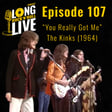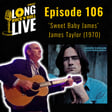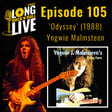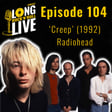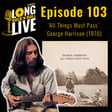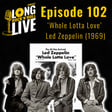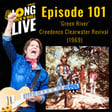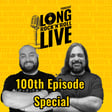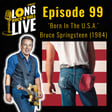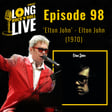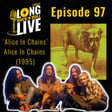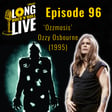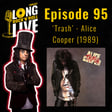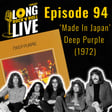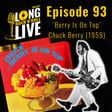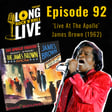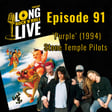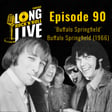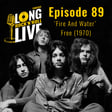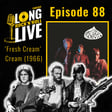Introduction to Long Live Rock and Roll Podcast
00:00:01
Speaker
Hello there and welcome back to another episode of the Long Live Rock and Roll Podcast with your host, Laz Michaelides, on the screen opposite me, the very sharply dressed Mr. Felipe Amarin. How you doing, bro? How you doing, everyone? Yeah, man. Yeah, sharply dressed. You're looking sharp tonight, man. That beard's coming on. You're still on that ZZ Top Bear.
00:00:21
Speaker
Yeah, I'm on a ZZ Top project, so I want to grow my beard all the way. I don't know how long it's going to take, but, you know, I'm working on it. Actually, I'm not working on it because that's what you need to do. That's why I'm bald, because it requires less work. You don't have to pay for getting your hair cut. It's the same with growing your hair long, isn't it?
00:00:42
Speaker
Yeah, exactly. My hair is long and my beard is long. I don't care. I just don't need to do any work on it. Perfect.
Focus on Classic Rock and Eagles' Iconic Album
00:00:47
Speaker
Welcome to the show, everyone, for new listeners and viewers. We are an independent podcast who talk all things classic rock music. The name of the podcast is obviously Long Live Rock and Roll, but what we do here is we talk about classic albums.
00:00:59
Speaker
We talk about what made them great looking back at them now from from sort of a modern perspective and what we think people in this day and age have the benefits of listening to them. So one of the albums we're going to do today is in fact one of the best selling albums of all time. Did you choose this one for Lee Pills and me?
00:01:18
Speaker
Oh, that was my choice shows.
Discussing Hotel California: Themes and Cultural Reflection
00:01:20
Speaker
So Felipe has chosen Hotel California by Eagles from 1976. Felipe, let me just do the quick details when you tell us a few details. So the name of the album's Hotel California the artist is Eagles.
00:01:34
Speaker
It was released on December 8th 1976 and recorded between March and October 1976 with a length of 43 and a half minutes. It comes in as a rock style album. The label is Asylum and the producer was Bill Sincik. So Felipe would you tell us please, why did you choose this album? I chose the album because of the song.
00:01:59
Speaker
I think the Eagles got one of the the other like best selling albums of all time is the the best of the Eagles or something. Yes, it was their one before this, wasn't it? Well, no, I think it's a compilation. I think it's after this.
00:02:12
Speaker
Yeah, but oh, OK, I thought it was the compilation of the albums before this one. I could be wrong. It could be. It could be. I actually don't know. Yeah. But I know the compilation is a best selling this one as well. So I knew like the hits like songs like Take It Easy and Hotel California. But I love Take It Easy. It's love. Yeah.
00:02:32
Speaker
But as we do albums, we don't do compilations and we don't sometimes talk about bands and the whole career, but that's really hard to to approach in one episode. So I thought about picking one album. And this is probably the most iconic of their albums, one because the song is one of the biggest rock and roll like hits of all time.
00:02:55
Speaker
And the album cover is just simply beautiful as well. So I think all the classic rock albums or most of them have have iconic covers, isn't it? Like The Dark Side of the Moon, you know, like Led Zeppelin 4, all those classic albums that we like.
00:03:10
Speaker
And the album covers something that it's always in my head. And this one is quite remarkable as well. And I think the song, the title song is what led me to choose this album. And I wasn't familiar with the whole album. I'm not even that familiar with the Eagles. And the one thing I really like about them as a drummer is like the main singer in the band is a drummer, isn't it? Yeah, it reminds you of the band, doesn't it?
00:03:37
Speaker
Yeah, it does. Yeah, yeah. I've got a few things to say about the band in relation to this, because they remind me of it. It's just I just I love how, especially in this album, we've got different, I don't want to say different vocalists on each track, but each of the band members takes turn of being lead vocalist on his album list.
Exploration of Americana and the Eagles' Unique Sound
00:03:54
Speaker
Again, that was very similar to the band. For anyone who's not familiar with the band, we are talking about a band called The Band. We did an episode on them. I think it was episode 21 or 20. But go and check that out.
00:04:06
Speaker
And they were an Americana band from the late 60s who basically they had four different lead vocalists and there was not one set lead vocalist. Now, as you said, the main lead vocalist in Eagles is Don Henley because he was the drummer, but they all took a turn. Glenn Frey took the lead vocals on the second song. And it's just, yeah, it's just interesting, isn't it? There's quite an Americana country thing, isn't it, where we share the vocals.
00:04:34
Speaker
Yeah, and it's cool because like every everyone in the band is an instrumentalist and everyone's a singer. Yeah. Although I have something to say about it, I think, well, Don Henley is not the drummer. He's he's such a great singer. I'll I'll dare to say he's the American Phil Collings, right? Plays drums and sings to a really high level, even reminds me of Phil Collings at some point. And
00:05:01
Speaker
And it's such a phenomenal singer. Some of the other band members, I don't remember which of the guitar players said that he could sing anything. He could sing the phone book if he wanted to. So he would turn anything into music and his ability to create melodies was so good and his vocal technique was so good.
00:05:21
Speaker
that I think the issue with them in my view is like he is, in my opinion, much better than the other guys as a singer and that kind of stands out.
00:05:32
Speaker
Well, it's funny, going back to the comparison with the band, the thing that was different with the band is that they all had such different voices, didn't they? You could tell which one was singing on which song. Whereas here, apart from the quality, as you said, they do all have similar tones and timbres, don't they? But Donna Henley just has a bit more technique, isn't it?
00:05:55
Speaker
Yes, exactly. And the expression as well, the way he articulates every word and the way he puts passion into the performance as well as the technique, makes him such a phenomenal singer. And I think that's one of the main reasons for the Eagles success. Despite the fact that people
00:06:16
Speaker
will always comment on the fact that he's a drummer who sings, which is a cool thing. It's not like the drummer being the band leader and the lead singer. Well, they're still touring with a complete different lineup and he might be the only original member.
Band Dynamics and Joe Walsh's Influence
00:06:32
Speaker
I'm really sure because they've played in Hyde Park last year, I guess. And a friend of mine even joked about it saying like, oh, yeah, there was an Eagles tribute band playing there.
00:06:44
Speaker
This has changed the line up so much. Without him, it would be really hard to make the Eagles work. I was just joking. I was going to say, funnily enough, this Eagles tribute band, the original drummer from the Eagles, he's in it.
00:07:00
Speaker
Yeah, I'm not sure if there's any other or regional members in the band. So one thing talking about Line Up, Joel Walsh, the guitar player, one of the guitar players, joined the band for this album and he sings one song at the end, I guess. Yeah, he sings track seven, Pretty Mage, all in a row. And he actually, he came into, as you said, for this album, because he replaced the founding member, Bernie Leiden,
00:07:23
Speaker
Now what's interesting about this is that Bernie Leiden was very country heavy. He composed a lot of the songs and he often went for that country rock style and the band did let's do a little bit of history here in terms of where the Eagles were. Do you know what I get? I get really you know how OCD I am and how
00:07:42
Speaker
proper I am with calling things the right name. They are called Eagles. Their title is not the Eagles. I just want to be like, you know where Eagles are, you know, I'll forget it for an episode. So where the Eagles were at this stage is the
00:07:59
Speaker
During this time in America in the mid-70s, they had this thing called the bicentennial celebrations. And this was where they were just celebrating all of the things, you know, American culture, American heritage, and this culminated with a Fourth of July celebration in 1976. And after these years of this sort of celebration, Eagles found themselves obliged to write an album that celebrated, criticized, embraced, and challenged the American dream, the American culture, and the American heritage.
00:08:28
Speaker
So and I read an interview with one of them who said, I don't want to get it wrong.
Storytelling and Themes in Hotel California
00:08:34
Speaker
Maybe I haven't got it done. They said that this is a concept album, but not an American concept album in terms of Wild West and Cowboys, but more urban concept album of America. Oh, interesting.
00:08:46
Speaker
Yeah. And several themes of the album include loss of innocence, the cost of naivety, the perils of fame and excess, the exploration of the dark underbelly of the American dream, idealism realized and thwarted, illusion versus reality, business versus art, corruption in politics, the fading of the 60s dream of peace, love and understanding all coming through. So this was really a reflection of America at the time.
00:09:15
Speaker
It's interesting because that's from an American point of view. We've analyzed albums by U2 and Supertramp, given their vision of what the American dream has become at the time. But then you're talking about Irish and English.
00:09:31
Speaker
musicians, given their view on it. Now, it's an American, a proper American band, who clearly know a lot about American music, don't they? Like the way they play their guitars. One of the things that really, really makes the album sound good, in my opinion, is the balance between acoustic and electric guitars, the way they mix it.
00:09:53
Speaker
you know the way they have sometimes a rhythm guitar being played on acoustic and the lead on electric and sometimes they have a slide guitar so I think that's a very American thing isn't it like that. Well I wanted to just add something to that and you said electric guitar and acoustic guitar and I want to add piano into that because there are a few songs that are piano led and we hear this quite a lot with American singer songwriters you know people like Carol King
00:10:19
Speaker
Yeah, she she was very piano heavy. James Taylor, he was very acoustic guitar lead. And I think what we're hearing here.
00:10:28
Speaker
even from that interview and the quotes I just gave, is a celebration of America coming through in this album. I know you normally do sort of a lyrical analysis. Have you looked into the lyrics of this album? Yes, I did. I did check on it. Well, in relation to what you said, there's a couple of, I'm going to cheat. I'm going to check my notes here. A couple of things about the lyrics.
00:10:51
Speaker
There's an interesting quote from Don Henley himself about Hotel California, because there's like a million interpretations of that song. And I've heard people say, oh, that's a guy who died and he's so strapped in hell. And it's like there's lots of things that people think about the song. But it's literally and it's not even about the hotel itself. It's just
00:11:14
Speaker
kind of a metaphor. So basically what he says about it, it's really good to check what the songwriters and the singers say about the song. It was really, so that's his quote, it was really about the excesses of American culture and certain girls we knew, but it was also about the uneasy balance between art and commerce.
00:11:34
Speaker
So it is about the music industry, it's about the lifestyle they were experiencing at the time, you know, parties and girls and booze and all that. And that's, I feel like they felt trapped in that culture and they kind of criticized it in the album. So there's a
00:11:55
Speaker
Yeah, does that relate to what you found about the album? It does, because this is another quote from one of them. I just really should have written down who said it, but he's one of the band members. I think it could have been Don Henley. He said that what we're trying to do is we're trying to wake people up and say, OK, listen, we've been all right for 200 years, but we're going to have to change if we're going to continue to be around.
00:12:16
Speaker
So I think I did if that's a calling on politics, on war or on nature. You know, we were talking a lot about climate change in the last few years. Could they have been talking about it back in 76? He said, the country is 200 years old. So we figured since we are eagles and the eagle is our national symbol, that we were obliged to make some kind of statement using California as a microcosm of the whole of the US. So this album, although it's called Hotel California, is entirely about California.
00:12:44
Speaker
but with California being the representative of the US. So I think take back to the last episode, let's look at London cooling. London cooling was probably the pin in the map of what the clash were describing the whole UK as using London as the example. And I wonder if evils have done the same and trying to describe the whole American situation, but using California as the base.
00:13:06
Speaker
I think, yeah, I think California is like a next separated version of of American culture, isn't it? It's like it's it's it's America, but louder. Like Florida. Yeah, so there's there's a there's a another quote from from Don Henning saying we were all middle class kids from the Midwest Hotel California was our interpretation of the high life in Los Angeles.
00:13:35
Speaker
So yeah, clearly it's like how they saw the LA culture and the LA nightlife and everything that people were doing in that place as
00:13:48
Speaker
as maybe an example of America is or maybe as the from the perspective of Californians, maybe. Yes, exactly. Yeah. Yeah. And even OK, again, about fame and fortune and the lifestyle, the second song, New Kid in Town, which when I first I'll tell you this is I did I didn't know the song. I have to confess when I listened to it, I was like,
00:14:11
Speaker
in love with the song for the first time I listened to it. And it's such a beautiful song. But my interpretation of it was like, oh, it's a love song. Or it's not when you're the new kid in town and everyone's talking about you, but someone is going to come along and everyone's going to forget about you. But it's not only about relationships and love and other stuff. So Don Henry said it's about the fleeting, fickle nature of love and romance. It's also about the fleeting nature of fame, especially in the music business.
00:14:40
Speaker
So he said, look, we know we are Red Heart right now, but we also know that somebody is gonna come along and replace us, both in music and in love. Wow, interesting. Yeah. I mean, something that, sticking on that song, I agree with you, I really love that song. It's probably my favorite on the album. Actually, do you know what? Let's get into the music of it, and I'm gonna start it off with the Lazz Unleashed. Oh, right. Do it. Here we go.
00:15:10
Speaker
Hotel California as a song is overrated. It's far from the best song on the album. There are at least three better in my humble opinion.
00:15:20
Speaker
Oh, wow. That's really harsh. I'm going to leave the room now. Disclaimer, disclaimer. I do not necessarily agree with any statements made by my co-host. Yeah, the views of LASMA and Kaleedis are not representative of the whole Long Live Rock and Roll podcast administration team, in terms of conditions apply. But I'll tell you what I think. I think for me, it doesn't really go anywhere.
00:15:48
Speaker
You've got the solo at the end, which is fantastic and I think the solos brilliant and I think that's actually is redeeming feature. If the solar wasn't there I wonder if people would love it as much as they do, because the solar is iconic but I don't think the solos are as good as free bird I don't think it's as good as stairway to heaven.
00:16:03
Speaker
in terms of just guitar solos. And then if you're comparing guitar solos, well, for me, I've got to look at what comes before the guitar solos. And yes, I get it. You've got that little, the bass and the drums doing their reggae thing and the guitars with the unusual sound, sounding a bit Spanish, a bit flamenco-y. And overall, you've got quite a progressive sound there. And I do like what they were going for.
00:16:25
Speaker
I just, it's cool, it's a good song, but man, I'll just say it right now, New Kid in Town, Wasted Time, Try and Love Again, The Last Resort, I thought they were all much better songs and songs that, it's not even like, Try and Love Again, I didn't love the song, but as a song and the way it was written, the melody, I just thought, wow,
00:16:47
Speaker
just blew Hotel California out of the water. But as always with Lads on Leash, that's just me. And it is, iconically, one of the most famous songs of all time. Why don't we kick off with that, the first song? Talk to us, you know, you said you chose this album because of that song. What does this song mean to you?
00:17:04
Speaker
Well, this song means, it reminds me of my teenage years when it was discovering rock music.
Live Performances and Song Development
00:17:12
Speaker
And obviously it was a radio song, isn't it? So it played many times on the radio. And I don't know about the UK, but back in Brazil, there's an acoustic version of it that played on the radio and on TV all the time. And it was more famous than the actual studio version of it, than the one you sent me.
00:17:33
Speaker
Yes, I've sent you a link that I'll maybe put it on. For new viewers and listeners, if you go down to the show notes, either in the YouTube description or in the podcast show notes, you're going to find a link to a playlist where we put in a Spotify playlist all the songs from the album we're talking about and any other songs we mentioned.
00:17:52
Speaker
down in the show it should also be the YouTube link to the song that Felipe has just, to the cover that Felipe has just mentioned. You guys might know it already because they use it in the Big Lebowski when the Jesus, the bowler, when he's coming, when he gets introduced to us they play this version of Hotel California. Yeah that's, I think it's the Gypsy Kings isn't it? Gypsy Kings, that's it, yeah. So we've got the YouTube link in there but sorry Felipe, carry on man.
00:18:15
Speaker
Yeah, it's such an interesting version. First thing, when I first heard that one in Spanish and the movie was like, that's funny. But the first version of the song I've ever listened to was Eagles. Like, I think it's kind of a reunion tour. They even do a joke at the beginning, say, oh, we never split up. We just took a 14 year vacation. So we're back now.
00:18:36
Speaker
And they played the song like in a beautiful way without drums. There's a percussionist and Don Henley sitting on a chair in front. So they all lined up. So you clearly see like it's almost like there's no band leader. They're all at the same. They're all in line at the front.
00:18:54
Speaker
and um or not in a row like at the front and Don Henley is singing I thought he was like lead singer I didn't know he was a drummer when I saw the video so I saw that on tv and I used back in the days to record things in VHS every time there was a music show on tv I would just record it so I've watched that video a million times and what really impressed me was at the end everyone takes the solos in it so like
00:19:18
Speaker
So it's not one guy playing guitars, many different guys. And I totally believed that the band was that. The Eagles were an American folk acoustic band. So I didn't know the electric version of the song with drums and electric guitars. So I had a completely different impression of what the band is.
00:19:40
Speaker
But anyway, so that's that's the reason why I get to know that song and Eagles. Did you? I said not the Eagles. Well, when you heard when you heard the electric version, did you did you prefer it or did you still prefer? I did. And I don't know. I still prefer it without drums, which is funny for a drummer. Listen, if you in any case, listen, after we've done recording, see if you can find the clip that you just said about all of them.
00:20:04
Speaker
Oh it's the one I think it's one of the the links I sent you. Oh okay yeah you did send it to yeah again guys that'll be only in the show notes. So yeah so you have all of them like and it shows everyone
00:20:17
Speaker
Just that song along shows you that everyone is a great instrumentalist in the band. So I believe, I'm not disagreeing with you, the song could be considered like, you can't say it's overrated if you compare it to the rest of the album. It's a phenomenal album, I guess. And the one criticism I have about the album is the rock songs are so good that I think there's way too many ballads. They could have put a couple of more
00:20:47
Speaker
hard rock songs in the album, because I love the ones they do. But regarding the song, the way he came about was, let me check. Don't fail the guitar player.
00:21:01
Speaker
He had a cassette tape with about, according to him, 16, 17 unfinished songs and ideas for songs that eventually became some of the tracks in the album. And he gave every musician in the band a copy of that tape and say, like, guys, listen to it and see what you like. And Don Henley came to me, oh, can we work on that Mexican reggae? I really like it.
00:21:25
Speaker
So the first name they gave Hotel California was Mexican Reggae, because they didn't have a name for it. Well, it's very appropriate. I mean, like I said, I thought when I did my notes, I said Spanish flamenco music, but Mexican, very similar. And yeah, the bass and drums, it's all very reggae, isn't it? But when you think...
00:21:48
Speaker
And there's some team ballast spills instead of like, instead of playing the toms for the fields. I don't know if you overdubbed it or it's part of his drum kit, but it's some team ballast at some point. Sounds like percussion, typical Latin percussion. And there's one really short team ballast fill, I think just before one of the choruses. And those details for me is what they do best. So like one
00:22:13
Speaker
percussion feel really short before the chorus, or one beat stop before something happens, or one extra layer of guitar right at the end of the song. They're really good with that in arrangements. So yeah, so this song, what makes this song special is not a typical rock song for me. So it's long, it's got loads of solos at the end, which a clever thing, because their radio can cut it short if they want to. So you deliver all the
00:22:40
Speaker
all the commercial side of it first, you know, verse, chorus, verse, chorus, verse, chorus, everyone can sing along, everyone gets the idea of the story. At the end, everyone is playing their long solos like until whatever, until forever.
Unique Musical Elements and Storytelling in Eagles' Songs
00:22:53
Speaker
And they have elements of reggae and Latin music, super cool. The pop fans stop after four minutes, the rock fans carry on for two more minutes.
00:23:01
Speaker
Well maybe they start after four minutes. So yeah, it is for me undoubtedly one of the best opening tracks, just like London Calling for the album London Calling that we talked about. So this is a great title song for an album, a great opening track and I agree with you, definitely not the best. So maybe let's move on and talk about the other ones.
00:23:26
Speaker
Well, so I mean, we already mentioned the UK in town and I really, really enjoyed that. Probably my favorite on the album. I love the keyboards because straight away you've gone from that original. What was I just want to say that the kind of naturalness of Hotel California with the guitars, the timbales, the drums, the vocals, the bass.
00:23:46
Speaker
And then sort of straight away we switch to kind of more modern sound. And I say modern, but I mean, you know, modern for 1976, the keyboard intro straight away. This is lovely, isn't it? The song has a bit of a tango feel to it. And it actually reminded me of Randolph's tango by Thin Lizzy. Do you know what I mean?
00:24:10
Speaker
and just really nice vibe about it. I felt that, you know, Glenn phrase lead vocals are beautiful as well. But it's kind of got a progressiveness to it as well, mixing with the country, something that I'd expect here from, for example, Crosby, Stills, Nash and Young, very country based, but just little progressive elements sneaking in every now and then. Yeah, yeah, I think you can hear that. You can hear
00:24:37
Speaker
mainly from the keyboards in the song I guess. And there is another element of, it feels to me like the song gets more intense towards the end. It's like they add more stuff and the melody as well gets more tense in a certain way because the story is coming to a kind of not so happy conclusion, isn't it? I think the way he sees it as well.
00:25:05
Speaker
Yeah, exactly. And that's the one thing about the vocals, all of them, they have passion in the vocals and they actually delivering what the story needs. Yeah, regardless of technicality, isn't it? They all deliver it with so much passion.
00:25:17
Speaker
Yeah, and one thing that for me really relates to folk music in both those two songs that we're talking about so far is they are essentially storytelling. That's what it is. One thing that just came to my mind is when I listen to Hotel California, I think about a guy getting to a hotel
00:25:38
Speaker
and listening to people dancing and singing in the corridors. I can see the picture, I can see a movie. And this song, I was picturing this small town and this kid was maybe in his 20s, hand in hand with the most beautiful girl in town.
00:25:54
Speaker
And everyone is talking about him, he's waving at people in the street. So it's like really popular. And he starts to worry about it. And it starts to get a bit darker. And it's like, and after a couple of days, you know, he's not the talk of the town and not in a bad way, in a good way, no one cares about him anymore, because there's a new kid in town and that's it. So I really like
00:26:17
Speaker
the the way you can visualize the songs as a movie and it's fantastic yeah that's great point and you know what we owe some of that credit to the to the album cover because you
Iconic Album Covers and Lasting Impact
00:26:28
Speaker
can just kind of picture the opening shot of a movie being like you know sunrise 3 am in california the sun's just starting to come up over the sea uh and you just get the picture of this the top of this hotel with the palm trees
00:26:40
Speaker
Which is just so, yeah, but it is a fantastic photo, isn't it, for that album? It is, it is. We're going to talk about it at the end, if you give me a couple of minutes at the end, we'll talk about it. Of course, yeah. Shall we move on to the tracks that you say you're preferring, which are the rocky ones, which I've got is Life in the Fast Lane and Victim of Love. These two sort of for me go hand in hand in the album of being these kind of funk rock songs of the album.
00:27:02
Speaker
Yeah, so I'll say that those two songs alongside New Kid in Town are my favorites in the album for sure. Okay, interesting. And Victim of Love is the sixth track in the album, or seventh? Yeah, sixth, yeah. Or sixth, yeah. And it's cool. One of the things that makes it rock and roll is where it was recorded live with only vocals being overdubbed. And that's Don Hamming doing vocals again, but Don Felder was supposed to be doing vocals.
00:27:31
Speaker
but the bag didn't think was good enough. So the manager took him out for lunch and don't really record with the vocal track. Oh, poor Don Felder. Yeah, so it's just a bit like, it feels like a stab in the back, but it's one of those things that, those really difficult decisions that you have to make in the middle. Like leaving Sid Barrow on the side of the road and going off to the door.
00:28:01
Speaker
It's like, yeah, shall we pick him up? No. Leave a bad member on the road forever. Yeah, yeah. Never pick him up ever again. Yeah, this one is, you know, I wonder if they thought just telling him would be a bit too harsh. Sorry, mate, it's just not sounding good. But I don't know how they told him after. You know, the album's coming out, by the way, remember that song.
00:28:23
Speaker
or he listens to it with them and he goes, you know what, I don't remember seeing that note when I did that chorus. But the fact it was recorded, the band actually recorded live and I'm always advocating for this, I think modern rock music needs a little bit more of that. Getting the studio to play together in a rhythm guitar, lead guitar, drums and bass, just play start to finish
00:28:47
Speaker
record the take and keep it if it's good enough and if there's a mistake or two but the vibe is there and the fuel is there, just keep it. So that's a great song in that sense. It's heavy and slow as well. I was just going to say I found it to be the heaviest song of the album and the guitar solo led to that as well because it was really heavy just the way it's played. Excuse me.
00:29:09
Speaker
If you'd have taken the guitar solo and given different context behind it, it could almost be sort of hard rock, you know, even verging on heavy metal. But I thought that was a great song. Yeah, really, really, really heavy. Both of these songs, though, this one and Life in the Fast Lane, both have a funk vibe to it. Now, do you know, Life in the Fast Lane, when I first heard that song, I thought I was hearing another song by mistake. Can you guess what that song was? Oh, wait a minute. Wait a minute.
00:29:38
Speaker
Yeah, because there's another riff that sounds like that. I've given a clue by saying a word already. No, I can't. So as soon as I heard this, I heard Play That Funky Music by Wild Cherry. Oh, yes. Can you hear the similarity?
00:29:54
Speaker
Yeah, yeah. It's very simple. It's kind of like still a hard rock guitar riff, but there's definitely a funky element about it. You know, life in the fast lane. And then play that funky music is... And it's just got that little bounce, that little element of funk that takes it from being a pure hard rock riff and just, well, I've said it, it funks it up, doesn't it?
00:30:17
Speaker
Yeah, it does. It's quite funky and it has everything to do with the lyrics as well. And one really interesting story about this one is the riff was a warm-up exercise. Oh really? So that is probably Joe Walsh's first big contribution
00:30:36
Speaker
to the band is a huge component. Yeah, exactly. What a phenomenal guitar riff. And basically he was doing that to warm up. So it's a kind of finger exercise for guitar. I think he came up with the exercise. I don't know. So he was just like playing that as an exercise to warm up. And the guys in the band said, wait a minute, that's pretty cool.
00:30:57
Speaker
let's develop that the whole idea into a song and it became so and it's a fast riff isn't it? It's a really cool and it's got everything to do with the lyrics and it relates to that thing about LA lifestyle being cut through really fast really quick. Did you have anything else by that song? No I think that sums it up I guess. I wanted to go on to the next two songs because
00:31:28
Speaker
There was a certain feeling when I was going through this and listening to the album from start to finish for the first time. I was thinking, okay, all I've gotten so far is three songs, good songs, but they're all different. There's not really a combining, anything that's tying the album together at the moment.
00:31:48
Speaker
And then we move on to track four wasted time and track five wasted time reprise and those songs. Now, although they don't sound like any of the previous three songs, there was something about
00:32:03
Speaker
hearing those songs one after another that really touched me when I listened to the album because wasted time is like a you know you could imagine it's so heartfelt you can imagine Brian Adams was influenced by this you know like it reminded me of a song called Lonesome Susie by the band which again will be in the playlist and it drew on so much more so far we'd heard
00:32:26
Speaker
reggae Mexican rock, we'd heard singer songwriter rock and we'd heard sort of funky guitar rock. But this had orchestras, it had string arrangements, it had classical instrumentation that was being utilized to an extent that we hadn't heard before. So that song on its own was brilliant and then
00:32:47
Speaker
We get the halfway stage of the album, wasted time of praise. Excuse me guys, so I've been ill all week so my throat's a little sore. And I just thought, this is epic because it's almost like you're going to see a show and they've done the first half. The curtain comes down, the band are gonna take a break, the orchestra are gonna play a little one and a half minute song using the themes of the previous song. We're gonna, everyone take their seats, go and get a drink. Curtain rises again and we finish the album.
00:33:16
Speaker
And I just thought that was the moment for me, which made me think, yes, I'm going to take this album seriously. Not if I didn't before, but you know what I mean? It was just like, wow, this is a game changer. Before that, I've just heard a good song followed by a good song followed by a good song. But then we get what makes a good album. Yes, it does. And you have the orchestral version of it as
00:33:38
Speaker
Yeah, it's kind of starting again, isn't it? It's like clearly splitting the album into two different parts. You can hear the A and the B sides of the album separated by one song and that one song happens in two different forms. I like that. It's very like a prog rock, the idea. Yes.
00:34:02
Speaker
Yeah, it is. All of the song itself is a love song, it's a ballad, it's a pop ballad, in my opinion. And I dare to say that could be an Elton John song. Yeah, yeah, absolutely. It does remind me a lot of his stuff. It's a piano lead, isn't it? Just piano vocals for a bit before other stuff comes in. Exactly. The piano is the main instrument in the song and it's about a breakup. So I think everyone can relate to that. And it also
00:34:32
Speaker
It's, let's put it like this, it's lighter than everything else. It sounds to me that the whole idea of criticizing that lifestyle and songs about, you know, living in a fast lane kind of vibe. And then you get into this, okay, there's a breakup, let's talk about love.
00:34:50
Speaker
It's lighter in terms of music, but lyrically, it's quiet. It's deep, it's sad, but it's a bit more like, okay, we're going to talk about feelings, we're going to talk about something, not about, you know,
Album's Emotional Depth and Diverse Influences
00:35:06
Speaker
uh not about booze and cars and and sex and all this do other stuff they're talking about on the first songs yeah brilliant um well we really touched on victim of love next we got the song or track seven is called pretty maids all in the row and this is where joe walsh gets his lead vocal debut for eagles um and the funny thing is that when i first heard it and i first heard his vocals it instantly reminded me of david bowie
00:35:30
Speaker
just the tone of his vocals, like him off the Hunky Dory album, I'll find a song and I'll stick it in the playlist. But again, another piano led song, another sort of softer singer songwriter song that we're getting, they even had some R&B vibes in it as well, I felt.
00:35:46
Speaker
Yeah, yeah. Interesting, interesting point. I wouldn't think of it now, but now that you said, they do have it. Yeah, they do have it. And it's a beautiful song. And it sounds to me that this song is simply not pretentious. No, no, it's not, is it?
00:36:02
Speaker
It's just there, it just sits nicely in that second half of the album and it's a good transition to the very end of the album. Exactly, because the last two songs of the album I think are the two best songs on the album, best written, best performed, best lyrics, best execution, best orchestration, everything. I want to hear why, that's interesting, I like that.
00:36:26
Speaker
So I'll just finish my point that victim of love is quite a heavy song and I think you needed something to break it up and so I thought Pretty Mage All In The Row was really good.
00:36:36
Speaker
a good way to break that up. Now you've said to me why and this is because so I've actually got here that I think the best song on the album is Try and Love Again. My favourite is New Kid in Town and The Last Resort but I think the best written song is Try and Love Again and that's because for me you have the perfect amalgamation of each of the best qualities of the album
00:36:57
Speaker
You've got the rock guitar solos. You've got the piano led verses somewhere. You've got country chord progressions. You've got vocal harmonies. That's something we haven't even talked about yet. We've spoken about how good individually their voices are, but coming together, my God, they are another level. There's another YouTube video I've seen of them in the rehearsal room or practice room before a gig. And they're just doing, they do like three or four bars of music where they're practicing their harmonies.
00:37:22
Speaker
my goodness they are spot on and I just feel that the last two songs encapsulate everything that is perfect about this album because like I said we've had a few we've got that odd mexican reggae song you've got two of the fast funky rock songs in victim of love and fast lane then you've got some singer songwriter songs a new kid in town and wasted time and pretty maids all in the row and then they just bring it all together
00:37:47
Speaker
to close the album, taking the best parts of everything that we've loved in this album, bringing it together for our final two songs. And for me, the end of The Last Resort is just phenomenal because the orchestration, it's not just a simple violin in the back, sort of just plodding along, doing something to harmonize it. It's its own instrument. It's its own lead line.
00:38:11
Speaker
And it just, for me, it's hard to know. I can't describe, I just feel I had such an... It leaves you with that feeling of I want to listen to the whole thing again, doesn't it? Absolutely. Which is something that I think we got from most of the albums we're reviewing.
Crafting a Cohesive and Engaging Album Experience
00:38:26
Speaker
The ending of an album is such a crucial thing. It needs to be thought through like properly, because if you if you end on on a boring song or like predictable song, yeah, it just makes people think, OK, yeah, that's the end of the anticlimactic, isn't it? Exactly. Let me ask you a question. Yeah. Do you think what do you think? So hold on. What do you think is more important, a better album opener or a better, better album closer?
00:38:56
Speaker
Tough question. I think the opener, although I've just made my point about how to end an album, it can be disappointing, but the first song is just like the first song in a gig. If you play it well and if you have a catchy chorus or you have a phenomenal solo, something that makes that song really good, then you can keep the audience connected to you for a bit longer. If the first song
00:39:21
Speaker
is a bit too slow or there's nothing special about it. If it's boring or, I don't know, common. There's nothing unusual about the first song, nothing that makes you think, oh, something's going on here. Then you probably won't listen to the rest of the album. So I think in terms of
00:39:43
Speaker
Not even the artistic side of it, the commercial side of it, like you need to. You need something to grab the attention. Grab the attention. Once you hold the attention.
00:39:53
Speaker
Once you hold the attention and take the only journey, how you end that attention is important, but you're saying that you think that grabbing the attentions. But then you can find some similarities between the first and last track. They're both long songs. Most of the songs in the album have a normal length. The first and the last are quite long, and there's quite a lot of improvisation solos, and it's like long instrumental parts. It's kind of a statement, isn't it? On the first song, they give it two minutes of solo, saying, look,
00:40:20
Speaker
Yeah, we do. We know what we're doing here. We can play. So that happens again at the end in terms of we know how to arrange a song and the vocal harmonies. Regarding trying to love again, every time I'm listening to songs from the podcast, I take notes about a couple of things that I might find
00:40:39
Speaker
I don't know that I might find that I've never heard before in other songs or most people probably wouldn't notice. And I think those little things make the song special. One thing that obviously everyone can notice and try and love again is the harmonies are amazing. That's stunning. Especially towards the end because the melody gets more interesting at the end.
00:41:03
Speaker
And there's a short stop before the chorus, like it lasts for a beat. And it just prepares that brief moment of tension before a chorus. I really like that. And I think they did pretty well. And they had done it before in the album, didn't they? They didn't use it in any previous songs that I did, just once.
00:41:23
Speaker
Yes, just once. Yeah, exactly. So it could be a typical thing. It could be like, yeah, everyone does that, but they did it in such a subtle way. And I will do once, as I said. So yeah, it makes it special. The other thing about the song is the lyrics. The song title tells the whole message. Try and live again. It's like you read that and you start listening to the song. And I think if anyone is going through that kind of
00:41:48
Speaker
break up and think, oh yeah, every time I try to start a relationship, things go wrong, etc. That song can convince you. So it's not a happy song, but it's got a positive message, which is a good balance to the overall approach of the album in my opinion.
00:42:07
Speaker
That's a great point. One thing I want to go back on with regards to when we said that they only use that stop idea once, that for me is a theme throughout the album, especially with production techniques, keyboards, synths, and sound effects. They use it very sparsely. They only put it in when it feels necessary. There was some vocal effects on one of the songs. It could have been Hotel California, but I just felt that what they did is
00:42:36
Speaker
just looking at my notes. Yeah, I don't have it written down, but they do every now and then they put in a keyboard sound, and then it would only be there for the chorus. Or, well, let's just let's use that orchestration and the orchestra and the classical music as an example, not every song has it littered through it. And what that means is that when they put it in, in certain songs, so they might stick it at the end of track two, and then the beginning of track four for wasted time, then you get a whole one minute of it in wasted time reprise, then you don't hear it again until pretty maids all in a row.
00:43:06
Speaker
And then at the end, they just hit you, at the end of The Last Resort, they hit you with all of the classical instruments. And it worked because you haven't been bombarded with orchestras and violins throughout the album. You've just heard touches of it and you've been like, oh yeah, it was good in that song. Do you know what? If they have it, I'll take some more. Oh, do you know what? That was nice. If they give me some more, I'll take that. And then at the end of The Last Resort, it's just like everything's given to you at once and it's epic. It is, it is.
00:43:36
Speaker
I think it wouldn't have the same impact if it was happening throughout the whole album. That's a really, really good point. It's something that I didn't think of because when you have albums that use orchestration as part of the band or combined with the band, they can get boring or maybe it takes a little bit of the rock and rollness of the album if you have two classical elements to it.
00:44:03
Speaker
It feels to me that every little thing that happens throughout the whole album is meaningful. Nothing is there for the sake of it. They paid attention to every little detail and you can hear it because it sounds like a tight album. Regardless of whether they were tracking this all together or individually, it doesn't matter to that extent because
00:44:29
Speaker
If the drummer's done a fill, then the guitarist has paid attention and gone, oh, do you know what? Screw the power chord I was going to do at the end of that. I think I should do a nice little rundown or something. Listening to each other. Yeah. So critical when you're part of a band and when you're recording albums, because you've got to play off each other. You've got to hear little nuances and little ideas that others are bringing in so that when you do it and when you listen to it, you can say, yes, that's going to work. Then it meshes together and you just get a really great product, don't you?
00:44:58
Speaker
Yeah, exactly. And it's all about the detail. And that's why it took a few months to finish the album, I guess. It's not one of those albums that was recorded in two weeks. They used two different studios and it took a few months to finish. And you can see that they were trying to get every little bit of every song right. So there's no feelers in the album, in my opinion. I don't know. I just agree, yeah.
00:45:26
Speaker
Yeah. And that's a really, really hard thing to do. Talking about those details, one last thing I want to say is life in the fast lane. There's a guitar and bass phrase at 2 minutes and 30 seconds, roughly. It's a breakdown that happens after this light guitar solo. So this light guitar solo in itself, it's something really cool. And then the band stops and there's a phrase and the bass joins that phrase. And it's the one thing that happens only once.
00:45:54
Speaker
It's those things that make it special. Yeah. So I have a segment if you don't mind. Let's do it. Go and introduce it.
00:46:02
Speaker
So we have this segment where we try to rate how, you know, you try to compare things and stories behind songs to other songs and to other things and measure the level of rock and rollness. So let me introduce you to how rock and roll is that. So you've got to answer this last.
00:46:29
Speaker
The situation is Joe Walsh joins a really successful band, probably the biggest band in America or in the world at the time. And he's noodling at the rehearsal.
00:46:43
Speaker
And that becomes the riff of a song called Life in the Fast Lane. Your new member replacing an essential member of a band. That's the biggest band in the world. You noodle your guitar and someone looks at you, fuck yeah, that's a song. And then she then goes on to become one of the most iconic driving rock songs of all time, isn't it?
00:47:05
Speaker
Well, I think what makes this more rock and roll is that he's the new member. And I think you've got to also give credit and credence to the rest of Eagles, because we've heard stories, Metallica with And Justice for All, the new bassist was in, they turned the bass right down because they were missing their old bassist who did pass away.
Hotel California's Success and Cultural Impact
00:47:27
Speaker
So you hear stories about bands not instantly warming to new members, but for the rest of Eagles to have gone
00:47:34
Speaker
Do you know what? Yeah, screw it. Joe, let's use that riff, man. And then they use it. And not only do they use it, but they turn it into an iconic guitar riff. That's a solid 80. Solid 80. Cool. It is really rock and roll, isn't it? It is right. I don't know if you have...
00:47:49
Speaker
We could be talking about this album forever, but we're trying to keep that. I've got my monologue at the end, but before that, I just wanted to talk about the success of the album. We did mention it at the start, but it's one of the best-selling albums of all time, 32 million units sold.
00:48:09
Speaker
nominated for five Grammys, one song of the year, it lost out of that album of the year. Do you know what album it lost out to? No. Rumours by Fleetwood Mac.
00:48:22
Speaker
Wow, yeah. Tough competition right there. I think it was nominated for Song of the Year, I don't need one. But New Kid in Town won Best Arrangement for Voices because of the fantastic harmonies. Two times number one singles, Hotel California and New Kid in Town. These are some of the rankings of where they stand. So Rolling Stone have put it 37 in their 500 Greatest. Rock Critics and DJs have put it 48 out of 100.
00:48:51
Speaker
In the all-time top 1000 list, it got number 67. In VH1 100's best albums of all time, it got 38. Channel 4's public survey, the public voted it number 13 out of 100. And the song Hotel California is 49th in Rolling Stones 500 greatest songs of all time. So these are completely deserved accolades and awards, aren't they?
00:49:18
Speaker
They are. It's not coincidence that a lot of these people have put it so high up.
00:49:25
Speaker
And it's an album that everyone remembers, if not the album, the song of Tokyo, California, or the album cover, as I said. And I told you I had a story about the album cover.
Iconic Album Art and Final Thoughts
00:49:36
Speaker
Yeah, so the photographer for the cover is a guy called David Alexander, and the art director was John Koch. So John was directing the photographer, and he worked with the Beatles on Abbey Road and the Who on Who's Next.
00:49:51
Speaker
really good, really good art director. And so they wanted to capture the idea of the album of the Los Angeles lifestyle by heaven, the Hotel California as the album cover, but the Hotel California doesn't exist. Exactly. So they went to, I think it's called the Beverly Hills Hotel. Yeah, that's what it is. And they basically,
00:50:19
Speaker
shot the picture just before sunset because they wanted to get that kind of eerie vibe and it's not dark, it's not too clear and they said they were shooting blindly into the sun so they didn't know what kind of results they would get.
00:50:37
Speaker
out of the picture they couldn't actually see through the through the camera lens what was going on so yeah so and they actually that's what you should have asked how rock and roll is that because hey here's the album cover do you know what would you know what it's gonna look like nope
00:50:55
Speaker
That's a hundred rock and roll. Yeah, they were there like four hours waiting for sunset and the results. And they then got another artist called Bob Hickson to create the neon sign. And the really clever thing about it was, apparently there was an argument with the label. And you know, we love record labels, isn't it? They know everything about rock.
00:51:22
Speaker
So they know so much more than us musicians, isn't it? Yeah, so much more than the artists and songwriters. And they argued that the band names should be on the cover. So it should be Eagles Hotel California.
00:51:39
Speaker
And the art director said, no, they are the biggest band in the world. They do not need that name on the cover. And as soon as the song Hotel California is playing on the radio, everyone is going to know it's an Eagle song. So
00:51:55
Speaker
Fuck that. The band name is not going to be there and the hotel sued the band for using the picture. It's just insane. So John Cross, the artist, he brought his attorney with him and basically their argument was like, you have three times more bookings now.
00:52:25
Speaker
Your business has thrived because of this. What are you complaining about? I'm going to sue you because you're making me make more money. It's just insane. But anyway, yeah, that's the story of the album. Thank you. Well, let's bring it to an end. As usual, we've got my monologue to end it. And yeah, it's a little shorter this time, but I'll kick it off, right?
00:52:46
Speaker
It seems to me that Eagles have taken all of the stuff they're best at and focused on those elements while still creating a very unique and distinctive sound. They've got the chord progressions that are very country-esque, rock guitar solos and riffs, singer-songwriter with piano-led songs and orchestration behind, the stunning harmonies and melodies in the vocals, and the sparse use and only necessary of the keys, sound effects and production.
00:53:13
Speaker
It's an odd album because you don't ever know when the song is home or the signature sound because you have a couple of rock songs, a few piano-led singer-songwriter songs, a rock reggae hybrid and some that combine them all. Yet when you get to the end of each song it feels complete and familiar and for that reason I think it's a really good album.
00:53:33
Speaker
upon first listen I wasn't that impressed, like I thought good album but I didn't love it but as I listened again and again and started hearing little elements and characteristics that you might miss the first time round and it really does start to feel like a special album once you get to the end and it's so easy on the year that you can completely understand why it's one of the best-selling albums of all time. Wow, it's always my favorite part of the show.
00:54:03
Speaker
So should we call it a day there, bro? Yeah, man. Anything else to say, or just as usual, I know what Philippe is going to say, go listen to the album. Go listen to the album, buy the record if you can. And yeah, and just, you know, contact us in any form you can, just message us on social media or
00:54:24
Speaker
Please give us a review. I think it's really important nowadays. If you listen to this on YouTube or Spotify or whatever, anywhere on the internet, give us a review. Tell us how much you love us and what else do you want to...
00:54:40
Speaker
here on the show if you have any albums recommend etc so thank you very much guys for being with us yeah it would mean the world to us if you just go give it a like comment subscribe a review a little thumbs up an instagram follow a facebook follow you can find this everywhere it's at the bottom of the screen we are at long live rmr podcast everywhere and as Felipe said thank you for joining us and keep on rocking everyone and as usual take care and long live rock and roll

